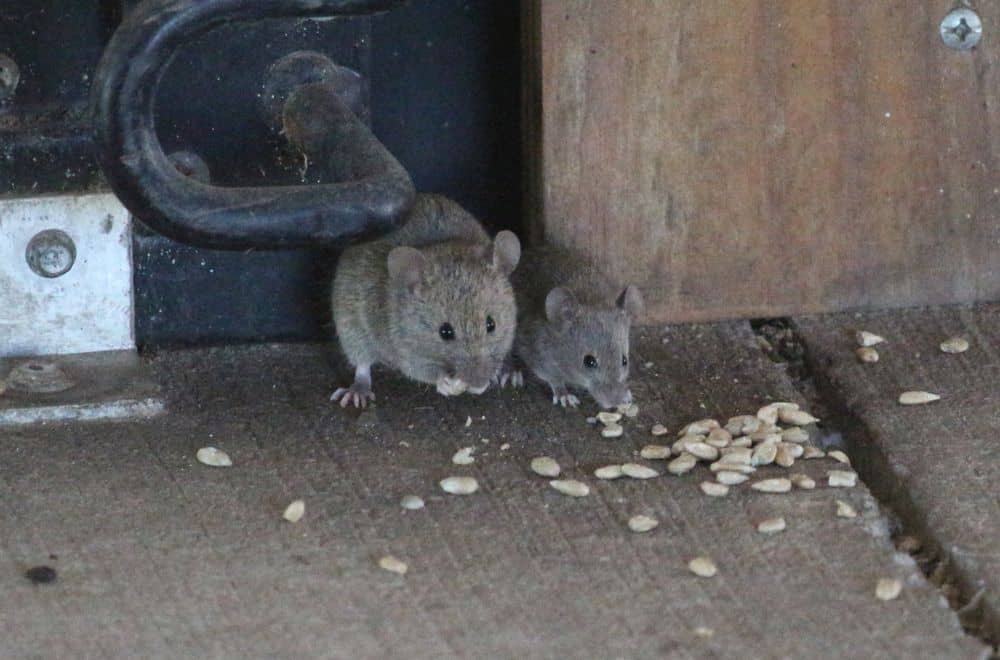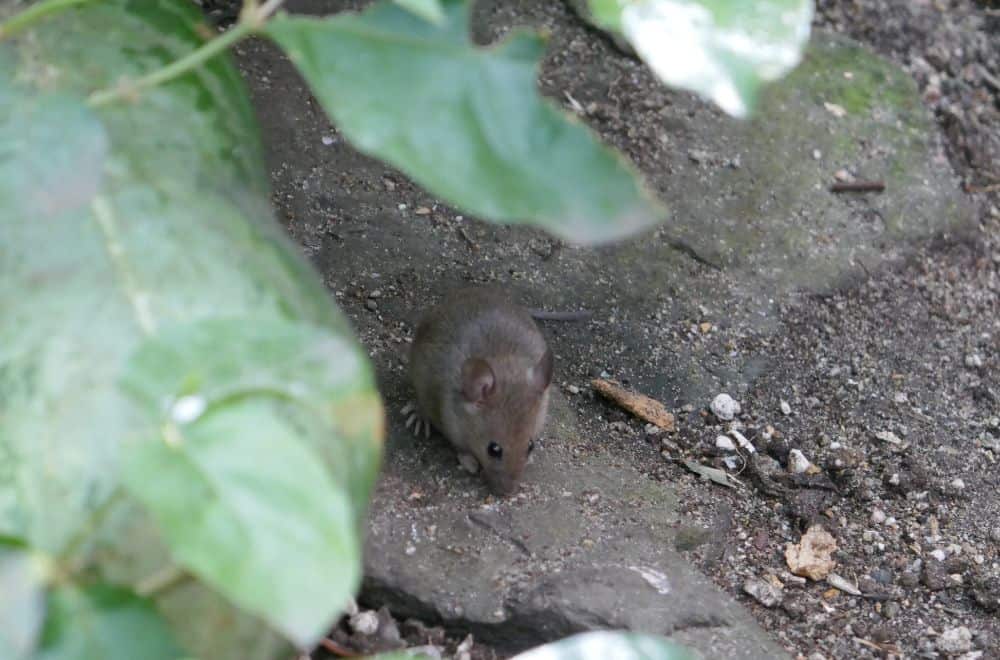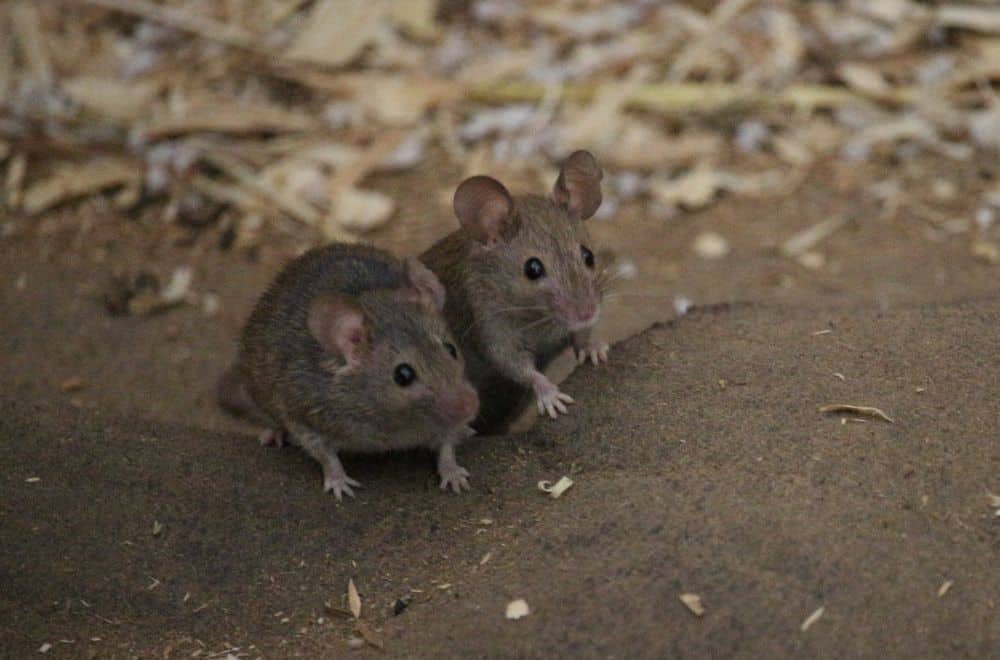Have you heard things going bump in the night? Are you worried that you might have a rodent infestation?
Never fear! We’re here to help you identify the sounds and noises that mice make. We’ll learn what other critters might be the culprits. And we’ll discover what those noises mean they’re doing!
Ready to find out more? Step this way…
When do you hear the Sounds and Noises from Mice?

An important clue to what might be causing the sounds you’re hearing is when they occur. Mice are crepuscular – in other words, they’re most active around dawn and dusk. So if those are the times you find yourself disturbed by unidentified noises, mice are a definite possibility.
But if you’re hearing the noises during the daytime, it might be other critters that are responsible. Squirrels, for example, are active during the daytime, and can often find their way into attics or other secluded parts of the house. Raccoons and opossums are other possibilities.
Where are they coming from?

The location of the sounds is another helpful clue. The aforementioned attic is a classic destination for mice – it’s dry, warm, and well away from regular human footfall. Inside walls, basements and crawl spaces are other popular haunts.
The key here is knowing that mice can get in through the smallest of spaces. If it can fit a dime, it’s big enough for a mouse.
That means that any gaps in walls or around door or window frames are good access points for mice. Cracks in the foundation, deteriorating siding, roof vents and chimneys are other likely candidates.
Not all of these can be stopped up. But by keeping your home in a good state of repair, you’ll minimize the chances of mice setting up shop.
It’s worth knowing too that mice have very poor eyesight. As a result, they often stick to the perimeters of rooms, so you’ll often hear them next to baseboards.
And they prefer to stay close to sources of food too. So if the noises are coming from a food store or kitchen, it could be a clue you’re dealing with mice.
Sounds and Noises That Mice Make
Mousey sounds can be a great early warning system. You’ll probably notice them before you find other signs of an infestation, like chewed wiring, droppings, or the less-than-delightful fragrance of mouse pee.
Here are some of the giveaway noises that could indicate there’s a mouse in your house…
1. Scratching
Mice love to scratch at wood and other surfaces!
And their tiny paws have tiny claws – which means that even general moving around can result in scratching sounds. Climbing, digging, and clawing are all standard mouse activities, and they can all be accompanied by scratching noises.
If you hear scratching – particularly if it’s somewhere like an attic or wall cavity – there’s a good chance a mouse is responsible.
2. Scurrying
Mice are busy little critters, and the sound of scampering paws is another sign they could be present in your home.
If your directional hearing is up to it, try to follow the sound. It could help indicate where the mice are gaining access to the building.
3. Gnawing
Mice are constantly chewing on things – and it’s not necessarily because they’re hungry. Their incisors – the teeth at the front – are continually growing. Gnawing keeps them filed down, and prevents them getting too long for the mouse to eat.
They also chew to create materials for a nest. Shredded paper and fabric are favorite materials. This type of chewing is particularly important for female mice needing to create a sanctuary for their young.
Unfortunately, it all too often means that the mouse chows down on things you’d rather it didn’t. That can include anything from wood to plastic, vinyl to uncured concrete! And it’s well known that mice can create a fire hazard by chewing through electric cables.
The sounds of gnawing, then, are another likely indication that mice are present.
4. Squeaking
Squeaking is how mice communicate, and you’re most likely to hear it at dusk or dawn. Squeaks can vary in pitch and tone, and some are too high pitched for humans to hear.
They serve a number of different purposes, including:
- warning other mice of danger
- alerting other mice to the presence of food or water
- attracting a mate
- intimidating rivals
Mice aren’t, of course, the only animals to squeak. Rats do it too, and so do squirrels. Mouse squeaks tend to be particularly high pitched, almost a chirp.
How to prevent mice in your home
Unless you’re keeping them as pets, most people won’t want to hear the sounds of mice in their home! Fortunately, there are plenty of ways you can minimize the risk of four-footed intruders.
1. Make access difficult
Mice are small and can squeeze into the tiniest spaces. Preventing them getting into your home, therefore, requires a fair degree of vigilance.
Check regularly for cracks in walls, loose roof tiles, and gaps around doors and windows. All these can provide an easy entry route for mice, so make repairs as soon as possible.
2. Take care of your outdoor space
Mice will take advantage of handy hiding places like woodpiles or long grass. And tall grass makes an excellent nesting site.
So not only will a manicured lawn make you the envy of your neighbors, it will make your garden less attractive to mice! And if they’re not in your yard, they’re less likely to find their way into your home.
3. Don’t provide them with a buffet
Mice are unfussy about their food, and they’re opportunistic feeders. And as we’ve already seen, their poor eyesight means they’ll stay close to reliable food sources.
It’s all too easy for your home to provide a good food source for mice. Stray crumbs, bags of grains, even pet or bird food, can all provide a tasty buffet. And with a good supply of food, the mice will breed rapidly too.
Mice have sharp teeth – so if they can smell food, they can chew through packets, bags or even plastic to get to it. Keeping food in airtight containers will reduce the chances of them finding it.
Regular cleaning is important too. And if you have pets, it’s a good idea to clean away leftover food promptly after they’ve finished eating.
Bird food is just as tasty for mice as for our feathered friends, so try to keep bird feeders a good distance away from your home. (And if you’re worried about squirrels, you might want to purchase a squirrel-proof feeder.)
4. Consider ultrasonic mouse repellents
Another option well worth considering is an ultrasonic mouse repellent. These are widely available, and aren’t expensive. They work by emitting high pitched sounds that cause discomfort to mice, but which can’t (usually) be heard by people.
They do, though, need to be plugged in, so you’ll need a power supply. And if you have pets or small children, use them with care.
Some models come with different settings for different pests. But even supposedly pet or child-safe gadgets can cause problems.
Every person – and animal – has slightly different hearing. We’ve even heard of cases where adults have sensitive enough hearing to be bothered by the noise. So it’s very important to check for any signs of distress as soon as you switch on the plug-in.
5. Natural repellents
A range of different substances have been recommended as natural mouse repellents. These often use strong smells which it’s claimed irritate mice and keep them away. Peppermint oil and eucalyptus oil are amongst the home remedies suggested to keep homes mouse-free.
There is little scientific evidence to support these, however. One study in 2014 did find that eucalyptus oil had some repellent effect on rats, but the research didn’t look at mice.
But whilst the science isn’t clear on essential oils (for now at least), there is more evidence about another substance…
Everyone knows that cats are the number one predator of mice. So perhaps it’s not surprising that the smell of cats sends mice packing! A 2021 study found that both the fur and the urine of cats was very effective at repelling mice.
Of course, cat pee is pretty effective at repelling humans too! So you probably don’t want to be spraying that around your home.
But if you want to keep mice at bay, getting a cat is a pretty good option. That even goes for cats who prefer lazing on a cushion to any serious hunting action! Their very presence will be enough to seriously reduce the chances of an infestation.
Just make sure you think through all the costs associated with keeping a cat safe and healthy. That includes food, regular vaccinations, and veterinary treatment when they get ill.
On the plus side, those financial costs will be more than offset by the huge fun factor of a feline companion. And you’ll also enjoy a mouse-free abode!
Sounds and noises that mice make: the final word
We hope you’ve enjoyed learning more about the sounds and noises that mice make. Knowing what to listen out for can help you identify any signs of an infestation early on.
Remember that mice are crepuscular. So if the sounds are happening at dawn and dusk, mice are a prime candidate. But if you’re hearing lots of noises during the day, other animals – like squirrels, raccoons or opossums – could be the issue.
